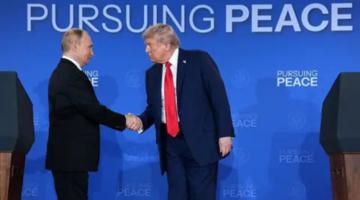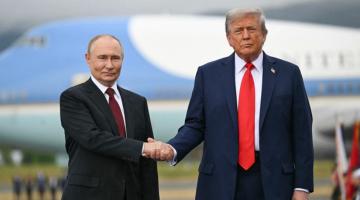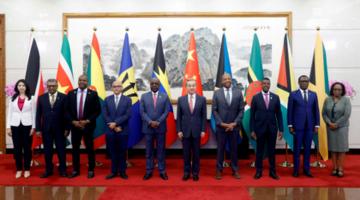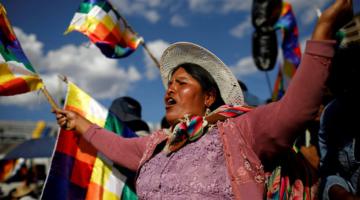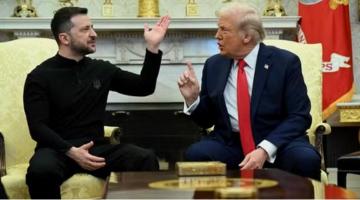Chinese Ambassador to Syria Feng Biao shakes hands with Khaled Hboubati, the head of the Syrian Arab Red Crescent (SARC), after signing an agreement for China to send food aid to Syria on Jan 16, 2022. (Credit: Xinhua)
Ukraine has been at the center of a massive geopolitical and economic whirlwind. But the turmoil caused by the U.S.-instigated conflict shouldn't cause problems for the Belt and Road Initiative.
This article was originally published on the author's blog "The Chronicles of Haiphong."
These edited remarks were given at an event titled “The Challenges and Opportunities for BRI Under the Background of the Ukraine crisis.” The full event can be viewed here, and my pre-recording has been posted to the Left Lens YouTube Channel and be found at the end of the article.
Thank you to all the organizers of this event, including the Belt and Road Initiative Quarterly Journal, the Russian Cultural House in Ankara, the Friends of Socialist China platform which I co-edit, the Turkish Student’s Union, and Kent University. My discussion centers on the politics of the Belt and Road Initiative (BRI) and how they ensure that the development plan won’t be derailed by the monumental crisis underway in Ukraine.
The Ukraine crisis has revealed quite starkly that there is a huge divergence between the path that’s being taken by the United States, NATO, the EU, and that of China. The former, perhaps more aptly called the Western imperialist sphere, has poured gasoline onto the fire that is the Ukraine crisis. The consequences have been enormous. Sanctions on Russia have sent shockwaves throughout the global economy. Economic growth has declined and inflation skyrocketed. The IMF’s economic forecast is dimmer now than it was prior to the Ukraine crisis and much of this is due to Western imperialist policy.
On the other hand, for China and the BRI, the situation is quite different. A commitment to peace and neutrality, cooperation, and robust and quality growth characterizes the partnerships within the BRI. It is clear that the massive trade and infrastructure project is not a prisoner of the moment. The BRI is not just about a single region or a particular country but rather an overall vision for global development that seeks to harness the present to brighten the future. The BRI does what Western-led economies such as the United States and its allies cannot and will not do, which is to offer opportunities for economic progress and true investment in all areas social and economic development.
The BRI, as Xi Jinping remarked, began in China but its achievements belong to the world. There are 140 countries and 30 international organizations that have already signed on to the BRI since 2013. Thus far, 8 trillion USD in trade and investment has been directed toward the BRI to cover the cost of more than 2,500 projects worldwide. The size and scope of the BRI demonstrates that it is not dependent upon the whims and the interests of the U.S. and the West. The BRI operates almost entirely independent of from Western imperialism, with the exception of the European countries which have accepted China’s invitation to join the project.
It is also worth noting that China is no stranger to operating in conflict zones. The world has been engaged in a war against the COVID-19 pandemic over the past several years and yet China has not only been able to extend solidarity and cooperation over this period but also advance the aims of the BRI. China has adjusted its own economic and political development in a way that takes into account the challenges of the global pandemic. That’s why China has achieved so much success in containing the pandemic and led the way in providing critical solidarity in the form of vaccines and protective equipment to Asia, Africa, and Latin America. The pandemic has been a flashpoint for a people’s war to protect human life and this war is inextricably linked to the BRI’s overall vision.
China has also prioritized Belt and Road Initiative relationships with countries such as Pakistan that have been embattled with external and internal conflict. Pakistan has been subject to numerous conflicts over the past decade alone, whether in the form of the U.S.’s drone strikes killing thousands of civilians or the ongoing struggle in Kashmir. While these sensitive issues have inevitably caused economic difficulty, Pakistan and China’s cooperation in the BRI through the China-Pakistan Economic Corridor (CPEC) has only grown. The BRI has already brought about significant achievements in Pakistan such as the launch of the first transit system in Lahore in 2020 amid the COVID-19 pandemic.
No matter what is happening internally in Pakistan, the BRI’s vision of development which emphasizes win-win cooperation rather than political interference or influencing the politics internally of any one country has been a major reason as to why these two nations have been able to build such a strong friendship despite internal and external threats to Pakistan’s stability. This includes a recent change in political administration just in the last few months.
The Biden administration recently completed his first trip to Asia, visiting South Korea and Japan in an attempt to organize the Southeast Asia into a conflict with China. The region has quickly become the most important flashpoint in the U.S.’s New Cold War and has been flooded with hundreds of U.S. military bases and hundreds of thousands of U.S. military personnel. Still, China has been able to build even stronger relations with the region that have led to remarkable achievements in the last few years alone. In 2021, the Sino-Laos high-speed railway was launched and is projected to increase economic growth for Laos by several percentage points. Laos is a country that was bombed by the U.S. more times than the entire number dropped in World War II during the U.S. invasion of Vietnam, Laos, and Cambodia in the 1960s and 1970s.
In January 2022, Syria joined the BRI as a major step in its own rebuilding process from the U.S.-led war on the country. The U.S. currently occupies 30 percent of Syria’s territory. Despite being engaged in a deadly conflict that has displaced millions and killed more than 300,000 people, the Syrian government is committed to rebuild the country through the BRI.
Of course, the Ukraine crisis has indeed inflicted damage on the global economy. Mainstream media reports have emphasized disruptions in rail traffic that have slowed global trade to Europe. While these short-term challenges will delay certain aspects of the BRI, particularly the Eurasia rail link, the vision of the BRI is more than a century long and remains an incredibly attractive project for development. The Ukraine crisis does not take away from the BRI’s global advantages. In fact, the Ukraine crisis is likely to make the BRI even more attractive to countries around the world, including Ukraine.
For one, the United States and its allies offer few alternatives in the form of financial and economic arrangements to help rebuild from conflict and war. Furthermore, the United States and the West is pursuing a policy that will make the Ukraine’s economy “scream,” to paraphrase Henry Kissinger’s description of Chile in 1970s during the U.S.-backed coup there. The U.S. has provided predatory loans to Ukraine since the war began. In addition, the U.S.-sponsored lend-lease program has provided Ukraine billions in military aid, $40 billion of which was just passed in the U.S. Congress. Ukraine will be expected to pay back what it has received in conditional aid, making these arrangements detrimental to Ukraine’s long-term economic stability and growth.
The neoliberal policies of the U.S. and the West are laying the foundations for the BRI to become an even more important feature of Ukraine’s economic future. Ukraine is one of the earliest member of the BRI. China’s capacity to maintain a stable relationship with Ukraine and strengthen the Russia-China partnership at the same time has demonstrated what it means to place narrow and selfish interests to the background and the interests of humanity in the foreground. Whatever short term difficulties arise from the Ukraine crisis will not derail Latin America, Africa, and Central Asia’s desire to adhere to the BRI’s principles of creating a win-win model of infrastructure and economic development that addresses the need for real South-South cooperation, decreases extreme poverty, and reduces dependency on external lenders.
The BRI is already doing just that. The World Bank has acknowledged that the BRI offers a path forward out of extreme poverty. Monumental achievements have already come out of the BRI in countries such as Pakistan and Laos. Though the Ukraine crisis is a warning shot about the dangers of war and the neoliberal path led by Western imperialism, China’s approach to global development as manifested in the BRI will not just remain consistent but is also likely to strengthen its influence within the international order in the coming period.

